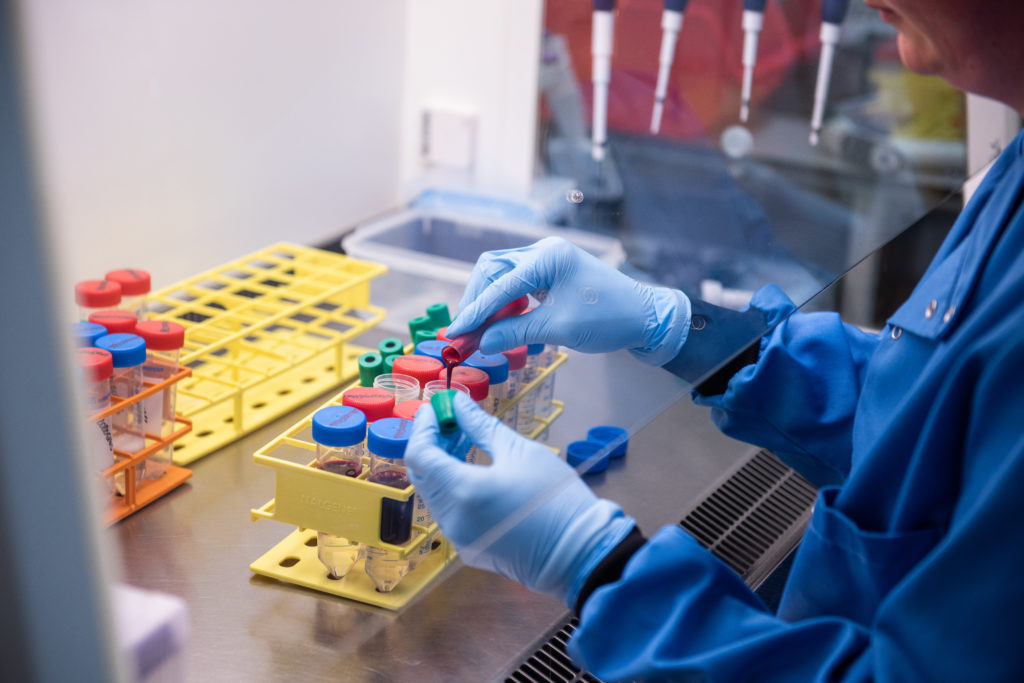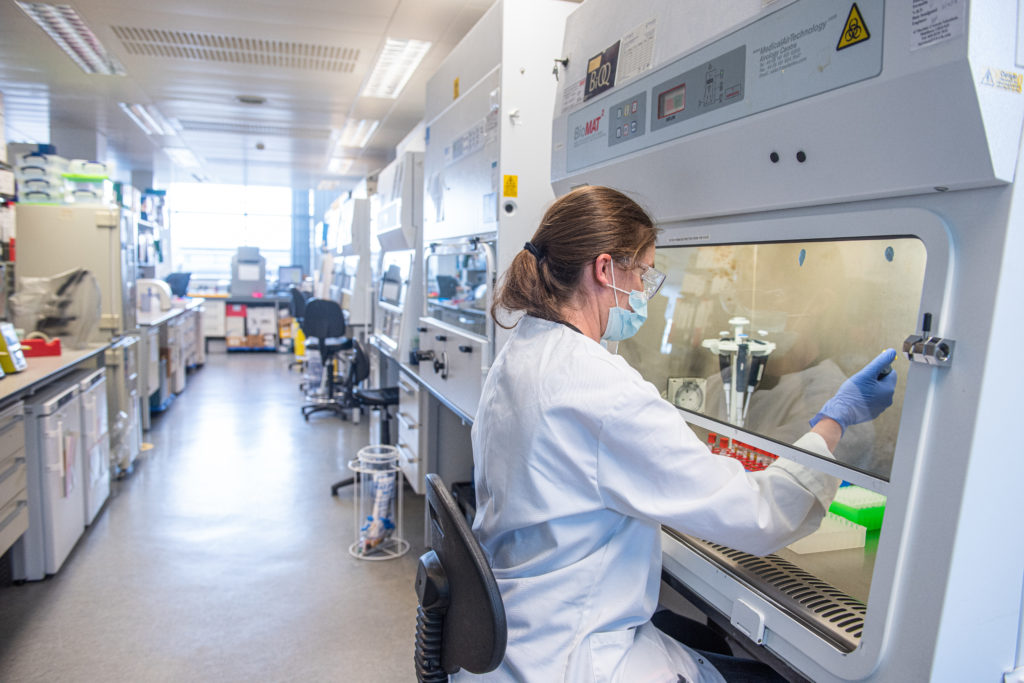The University of Oxford, in collaboration with AstraZeneca plc, has announced interim trial data from its Phase III trials that shows its candidate vaccine, ChAdOx1 nCoV-2019, is effective at preventing COVID-19 and offers a high level of protection.

The interim analysis indicates that the vaccine is 70.4% effective when combining data from two dosing regimens. This rises to 90% effectiveness if administered at a half dose and then at a full dose.
Professor Andrew Pollard, Director of the Oxford Vaccine Group and Chief Investigator of the Oxford Vaccine Trial, said: “These findings show that we have an effective vaccine that will save many lives. Excitingly, we’ve found that one of our dosing regimens may be around 90% effective and if this dosing regime is used, more people could be vaccinated with planned vaccine supply.
“Today’s announcement is only possible thanks to the many volunteers in our trial, and the hard working and talented team of researchers based around the world.”
Professor Sarah Gilbert, Professor of Vaccinology at the University of Oxford, said: “The announcement today takes us another step closer to the time when we can use vaccines to bring an end to the devastation caused by SARS-CoV-2. We will continue to work to provide the detailed information to regulators. It has been a privilege to be part of this multi-national effort which will reap benefits for the whole world.”
Following the trial reaching the target for interim analysis, the independent Data and Safety Monitoring Board (DSMB) recommended that the Oxford team conduct its first analysis on all the cases with data locked on 4 November 2020.
These preliminary data indicate that the vaccine is 70.4% effective, with tests on two different dose regimes showing that the vaccine was 90% effective if administered at a half dose and then at a full dose, or 62% effective if administered in two full doses.
Additional cases are expected to accrue by the time of the final analysis and future analyses will determine the duration of protection. No serious safety events related to the vaccine have been identified.

Oxford will now support AstraZeneca in submitting both the interim Phase III efficacy data and the extensive safety data to all regulators across the world, including in the UK, Europe and Brazil for independent scrutiny and product approval, including for emergency use. Many of these regulators have been reviewing the trial data on a rolling basis during the trial.
In parallel, Oxford is submitting the full analysis of the Phase III interim data for independent scientific peer review and publication. The coordination of the programme and execution of the trials in the UK would not have been possible without the support of the National Institute for Health Research and UKRI.
The Oxford BRC provided crucial funding to get the trial up and running and then helped to fund an evaluation of the safety of the vaccine. Both Prof Pollard and Prof Gilbert are leading members of the Oxford BRC’s Vaccines Theme.
The published data suggest that this half dose and full dose regime could help to prevent transmission of the virus, evidenced by lower rates of asymptomatic infection in those vaccinated. Further information will become available when trial data are next evaluated.
The interim Phase III data builds on Oxford’s phase I/II peer-reviewed trial results, which showed that the vaccine induces strong antibody and T cell immune responses across all age groups, including older adults, and has a good safety profile.
The clinical trials enrolled over 24,000 participants from diverse racial and geographical groups in the UK, Brazil and South Africa. They will now continue to final analysis.
Further trials are being conducted in the United States, Kenya, Japan and India and the trial team expect to have just under 60,000 participants by the end of the year. These trials will provide regulators with further information about the efficacy and safety of the Oxford candidate vaccine, including its ability to both protect against and stop the transmission of COVID-19.
As part of the University of Oxford’s agreement with our partner AstraZeneca, the vaccine will be supplied on a not-for-profit basis for the duration of the pandemic and in perpetuity for low- and middle-income countries.
The Oxford vaccine (ChAdOx1 nCoV-19) is made from a virus, which is a weakened version of a common cold virus (adenovirus) that has been genetically changed so that it is impossible for it to grow in humans.
Adenovirus vaccines have been researched and used extensively for decades and have the significant benefit that they are stable, easily manufactured, transported and stored at domestic fridge temperature (2-8 degrees C). This means they can be easily distributed using existing medical facilities such as doctor’s surgeries and local pharmacies, allowing for the vaccine, if approved, to be deployed very rapidly.
Oxford University’s collaboration with AstraZeneca has been crucial to the successful development of the vaccine and vital for its global manufacturing and distribution across the world. AstraZeneca already has international agreements in place to supply three billion doses of the vaccine, with access being built through more than 30 supply agreements and partner networks.
A key element of Oxford’s partnership with AstraZeneca is the joint commitment to provide the vaccine on a not-for-profit basis for the duration of the pandemic across the world, and in perpetuity to low- and middle-income countries.
Pascal Soriot, Chief Executive Officer, AstraZeneca, said: “Today marks an important milestone in our fight against the pandemic. This vaccine’s efficacy and safety confirm that it will be highly effective against COVID-19 and will have an immediate impact on this public health emergency. Furthermore, the vaccine’s simple supply chain and our no-profit pledge and commitment to broad, equitable and timely access means it will be affordable and globally available supplying hundreds of millions of doses on approval.”
About the Oxford COVID-19 vaccine
ChAdOx1 nCoV-19, now known as AZD1222 co-invented by the University of Oxford and its spin-out company, Vaccitech, is being trialled by the University’s Jenner Institute and Oxford Vaccine Group. The team started working to develop a vaccine against coronavirus in January 2020.
Developed at the Jenner Institute, the recombinant adenovirus vector ChAdOx1 nCoV-19 uses a viral vector based on a weakened version of the common cold virus (adenovirus) containing the genetic material of SARS-CoV-2 spike protein. After vaccination, the surface spike protein is produced, which primes the immune system to attack COVID-19 if it later infects the body.
Vaccines made from the ChAdOx1 nCoV-19 virus have been given to around 11,000 people to date and have been shown to be safe and well tolerated, although they can cause temporary side effects, such as a temperature, flu-like symptoms, headache or sore arm.
The potential vaccine entered Phase III clinical trials in May to study safety and efficacy in healthy volunteers aged 18 to 55 years, across 19 trial sites in the UK. The University of Oxford is also working with research partners at a number of clinical trial sites around the world as part of this late stage trial.